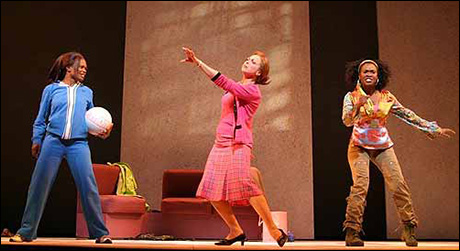Filichia Features: Let’s Have Another Baby!

Filichia Features: Let’s Have Another Baby!
Mothers and fathers shouldn’t be the only ones discussing the possibility of producing another baby.
Producers, directors, designers and actors should be having a new Baby, too.
The Baby to which I refer, however, is the 1983 Tony-nominated Best Musical that has an original book by Sybille Pearson, music by David Shire and lyrics by Richard Maltby, Jr.
Says Peter Loewy, producing artistic director of The Forum Theatre in Metuchen, New Jersey, “Of the hundred-plus shows I’ve done, the one that my audiences always kept asking to see again was Baby.”
Loewy brought it back. So should Broadway; so should you. Although the original production employed 16 performers, you can get by with eight – a much-welcomed solution in these economically challenged times. Furthermore, Baby doesn’t need anything more than a bed and blocks for a set.

LaChanze and Norm Lewis in Baby at Paper Mill Playhouse (Photo by Jerry Dalia - 2004)
Pearson’s book cleverly sets up three very different types of couples who find they’re expecting. She put them in a university setting – a nicely atypical locale for a late 20th century musical to take place.
Lizzie Fields and Danny Hooper are college students who’ve just reached their twenties. Pearson was wise to have her and not he be reluctant to marry. From Allegro to Zorba, many a musical has the woman desperate for her third finger on her left hand to be encircled by precious metal and stone, while the man is trying to keep her digit nice and naked.
Pam and Nick Sakarian are thirtysomething teachers. At rise, we see them in bed with the covers atop them, but notice that halfway down her body she sports a round bulge. So in a show called Baby, we’re within our rights to assume that Pam is already pregnant.
But as they say in the sports world, that’s a fake-out – and sports is not irrelevant to this situation, for what Pam has underneath the covers is a basketball; she’s a coach – as is Nick – at the college.
They’ve been wanting a baby for some time and have been trying hard to conceive. Such is not the case with Lizzie and Danny, who nevertheless find that a baby is on the way. Lizzie swears that she was careful with birth control.
Alan and Arlene McNally are college administrators who croon “Life begins at 43,” for the kids are grown and they’re now empty-nesters. Now, however, they learn that the nest will soon be refilled – even though they’ve had their fill of parenting. Expecting is certainly something they didn’t expect.
On the other hand, Pearson’s showing us a long-run marriage that’s still fresh – and one in which a couple continues to have sex -- is heartwarming. But Alan and Arlene know from realistic experience that having a newborn means you’ve given birth to a new boss. For the first months, you’ll cater to the kid’s every whim because a baby must have constant care. Months later, matters get worse for, as Arlene observes, “They’re not walking yet and they’re destroying the house.”

LaChanze, Carolee Carmello and Moesha McGill in Baby at Paper Mill Playhouse (Photo by Jerry Dalia - 2004)
All three women wind up going to the same gynecologist. Like all of us who’ve done time in a waiting room, each sits, reads and minds her own business. But Baby wouldn’t be much of a show if they all stayed silent and uninvolved – or if Pearson hadn’t also conceived of a dramatic conflict for each couple. No, Baby is not all hearts and flowers; every one of the relationships is threatened in a different way. The A-word is never used, but two of the couples do at least entertain a discussion on whether or not to keep the baby.
Baby that has long appealed to suburban audiences where parents are plentiful, but now time and new ways of thinking have allowed it to expand its horizons. No less than a quarter century has passed since Ken Mandelbaum, in his landmark book Not Since Carrie, offered a theory as to why Baby’s Broadway run wasn’t even as long as an actual baby’s gestation period: “The show was utterly heterosexual, a problem for some musical comedy fans.”
But times have greatly changed, haven’t they? Since Baby’s debut, the ensuing decades have seen more and more gays and lesbians in a parental mode. What’s more, their ranks are growing, be it by surrogate or biological parenting or adoption. Statistics say that many more than 100,000 gay couples now have children.
So Baby, produced six years before “Heather Has Two Mommies” was published, now has a whole new audience. At one recent production I attended, two men in front of me traded knowing looks after a certain joke or lyric was unleashed -- as if to say “Remember when we went through that?”
Many of us have experienced what we think is Love at First Sight, only to later come to the bitter conclusion that there’s no such thing. Ah, but parents know there IS: when you first lay eyes on your newborn son or daughter. The experience is not unlike getting into your car whose tank you filled last night, turning on the ignition and seeing the gas gauge zoom from “E” to “F.” Now both straights and gays have that feeling flood into them when they see their child for the first time.
At another production of Baby, I sat next to two women who were holding hands, except when they applauded a line that brought them back to their pregnancy. And of course they often unclasped hands to clap enthusiastically after each song – which the Maltby-and-Shire score deserves.
Danny, a budding composer, grouses “All the good music has already been written.” Perhaps, but that line rang false in 1983 when Broadway first heard “At Night She Comes Home to Me,” which Nick sings about Pam. It’s the Most Beautiful Broadway Song That Not Enough People Know.
Some shows seem destined to become musicals just on the basis of one logical rhyme. Here’s betting that after Maltby noticed that “hampers” rhymes perfectly with “Pampers” that there was no stopping him from writing Baby. We’re glad he continued. What ideas for songs!
“The Fatherhood Blues,” set to a jaunty Shire melody, points out that while men worry about all the things that plagued Billy Bigelow in Carousel, they Feel Like Men for being able to impregnate their wives. Later, Alan states that children are “Easier to Love” than wives, and Maltby lets him count the ways.
We’ve all heard the cliché that the ultimate goal of sex is having “the earth move” – but can that compare to a woman’s feeling her baby move within her for the first time? That’s well-detailed in Lizzie’s “The Story Goes On.” She also gets “The Ladies Singing Their Song,” which notes that many long-established mothers who see a young pregnant woman want to tell her what they went through in (too) great detail – the not-so-good, the certainly bad, and the indescribably ugly.
“What a journey! What a ride!” as one lyric goes. Yes, anyone who’s ever been a parent will be moved to tears at show’s end. Emotions alone are enough to warrant a first-class revival of Baby – and while producing it will involve (as all musicals do) a great deal of hard work (and plenty of fun), it WILL be easier than actually having another baby ...
You may e-mail Peter at pfilichia@aol.com. Check out his weekly column each Monday at www.broadwayselect.com and Tuesday at www.masterworksbroadway.com. His book, The Great Parade: Broadway’s Astonishing, Never-To-Be Forgotten 1963-1964 Season is now available at www.amazon.com.

























